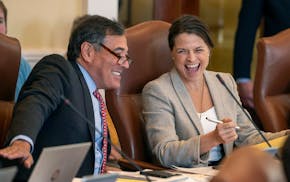MADISON, Wis. — Groups of up to 20 people can gather in the state Capitol without a permit, a federal judge ruled, striking down portions of the current policy requiring permits for all activities as an unconstitutional infringement on free speech rights.
Monday's ruling came in a case brought in February by the American Civil Liberties Union challenging the Capitol access policy enacted by Gov. Scott Walker's administration. The policy was revised in December 2011 following massive protests over Walker's proposal that effectively ended collective bargaining for most public workers.
The current policy required permits for any organized activity in the Capitol, even if it's only one person. Three or fewer people gathered "for the purpose of actively promoting a cause," such as lobbyists meeting with a lawmaker, are exempt.
U.S. District Judge William Conley issued a preliminary injunction on Monday requiring that no group of fewer than 20 people can be required to get a permit for Capitol access. He also said the policy's preference for "cause-promoting speech" was an unconstitutional content-based restriction on speech and cannot be enforced.
"The current permitting requirement sweeps in an enormous amount of ordinary activities that are unlikely to present any significant disturbance in the Capitol," Conley wrote. "It thus unnecessarily creates a chilling effect on the speech of the majority of individuals who are willing to follow reasonable conduct standards and co-exist harmoniously with tour groups, permitted events and other legitimate state activities."
He didn't rule on the constitutionality of the entire permit policy, but said the provisions he identified as unconstitutional "raises the question of whether the rest of the Access Policy can be salvaged." A trial seeking to permanently block those rules from being in place was scheduled to begin Jan. 13, but Conley scheduled a conference call to discuss the case with attorneys on Wednesday.
Wisconsin Department of Justice spokeswoman Dana Brueck praised the ruling for recognizing that the state has made "good faith efforts to keep the Capitol open for all users."
"We believe the decision as a whole recognizes the legitimate need and ability for reasonable regulations at the Capitol," Brueck said in a statement. She said her office was reviewing the ruling and hadn't decided whether to appeal it.
DOJ attorneys defended the policy during a court hearing in April, saying Capitol Police need to know the size of gatherings so they can properly allocate their limited resources and accommodate other events taking place simultaneously. They also argued that the policy advances the government's interest in maintaining the Capitol as an office building where employees can work in peace and visitors can mill about without being intimidated.
Larry Dupuis, the ACLU attorney who brought the lawsuit, hailed the ruling as a victory.
"He got the basic principle that this is a unique public space where people can express themselves to the people who represent them, therefore you have to treat it differently than you would the inside of any other building," Dupuis said.
The ACLU brought the lawsuit on behalf of Michael Kissick, an assistant University of Wisconsin-Madison professor who participated in protests at the Capitol, including the daily noontime sing-a-long. Kissick said he stopped coming to the Capitol in September when police began arresting and citing people who were demonstrating without a permit.
"I'm grateful to the ACLU and the federal courts for protecting our constitutional right to assemble and speak," Kissick said in a written statement. "Our country began with protest, and I feel certain that Sam Adams would approve of this ruling."

Biden scores endorsements from Kennedy family, looking to shore up support against Trump and RFK Jr.
The Latest | Seated juror in hush money trial excused as prosecutors ask judge to sanction Trump
Vice President Harris returning to Wisconsin for third visit this year
Former Wisconsin Democratic Rep. Peter Barca announces new bid for Congress

